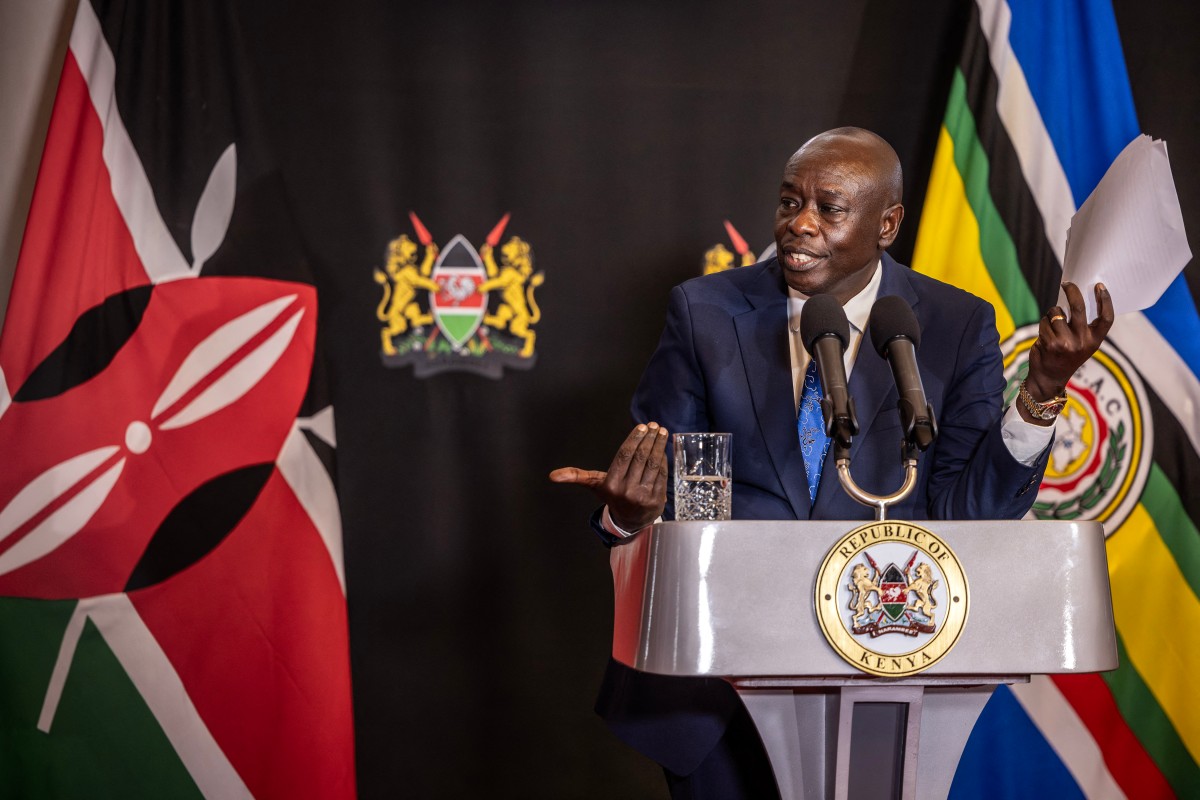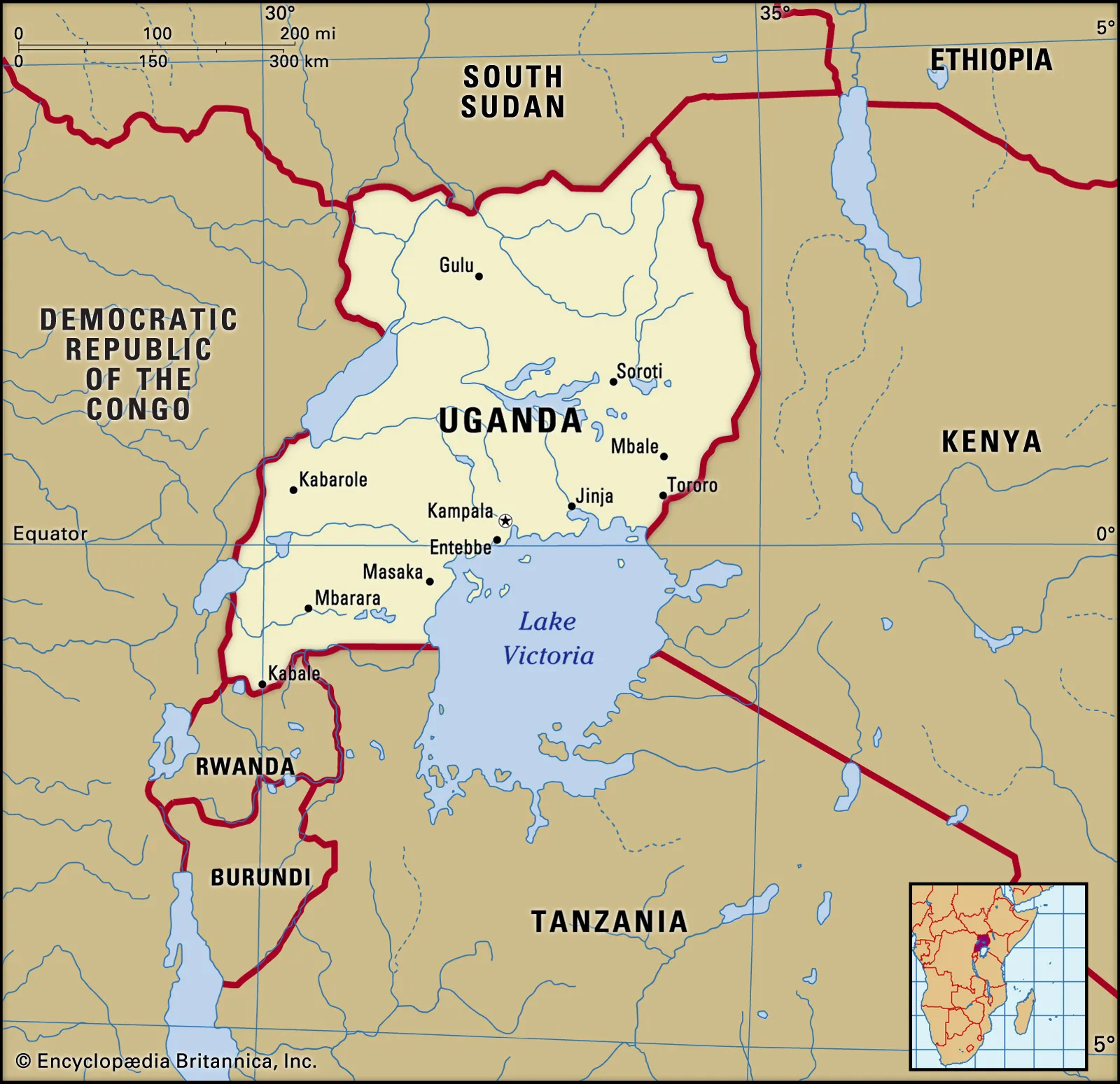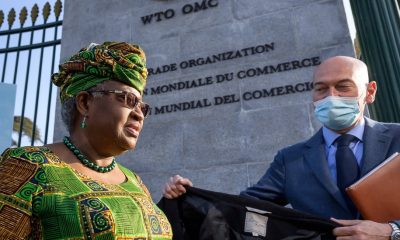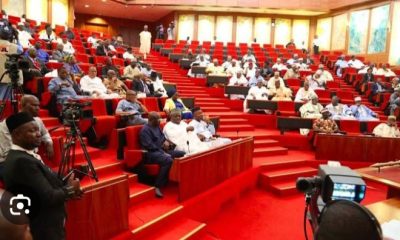Africa
Corruption Pushing 60% Nigerian/Other African Youths To ‘Japa’: Poll

Sixty per cent of African youths, including Nigerians are looking to leave because unchecked corruption threatens their future, according to a poll of more than 5,600 youngsters in 16 countries released Tuesday.
Corruption is seen as the “single greatest hurdle” they face to achieve their own potential and a better life, said the Johannesburg-based Ichikowitz Family Foundation which commissioned the poll of 5,604 people aged 18 to 24.
“Most of all, they don’t believe their governments are doing enough to address this scourge and because of it almost 60% are looking to emigrate in the next five years,” it said.
Japa is a Yoruba language word used as a Nigerian slang term that has gained widespread usage among Nigerian youths. The term is used to describe the act of escaping, fleeing, or disappearing quickly from a situation, often in a hasty and urgent manner.
The 2024 African Youth Survey, which the foundation says is unparalleled in scope and size, was conducted via face-to-face interviews in January and February in countries ranging from South Africa to Ethiopia.
North America was the top pick for emigration for this age group, followed by Western European countries such as Britain, France, Germany and Spain.
More than half (55 per cent) of those polled said Africa was headed in the “wrong direction”, although there was a modest rise to 37 per cent in “Afro-optimism” from the 2022 survey.
“They want tougher sanctions against corrupt politicians, including banning them from standing for office. They also want a different form of government,” the foundation said.
Although about two-thirds of those interviewed believe in democracy, around 60 per cent were in favour of an “African-infused” form.
Nearly one in three believe that non-democratic systems, from the military or one-party rule, could be preferable under certain circumstances.
– China influence –
Most of those polled (72 per cent) said foreign influence was an issue. “They are concerned about their countries being exploited by foreign companies especially their natural mineral wealth being mined and exported without any further benefit to the people,” said the foundation.
A large majority (82 per cent) considered China’s influence as positive, with 79 per cent saying the same for the United States.
Perceptions of Russian influence increased, notably in Malawi and South Africa, with more than half of those with a positive view of Russia citing its provision of grain and fertiliser.
Most said a Donald Trump victory in the US presidential elections would be a far worse outcome for Africa than a win by Democratic nominee Kamala Harris.
The African Youth Survey, first conducted in 2020, aims “to give voice to Africa’s youth in a scientific manner,” the foundation’s communications director Nico De Klerk told AFP. It also provides useful data to governments, NGOs and investors.
Africa has the world’s youngest and the fastest-growing population.
The median age on the continent in 2020 was 19.7 compared to 31.0 in Latin America, 38.6 in Northern America and 42.5 in Europe, according to the Mo Ibrahim Foundation.
Africa is home to nearly 420 million youth aged 15-35, one-third of whom are unemployed, the African Development Bank says. The population is expected to double to over 830 million by 2050, it says.
The 2024 African Youth Survey was conducted by PSB Insights in Botswana, Cameroon, Chad, Congo Brazzaville, Côte d’Ivoire, Ethiopia, Gabon, Ghana, Kenya, Malawi, Namibia, Nigeria, Rwanda, South Africa, Tanzania and Zambia.
Nigeria And The Japa Syndrome
The mass exodus of Nigerians to the United States, the United Kingdom, Canada, Australia and other advanced nations in search of greener pastures has been tagged “japa” which the elite referred to as a syndrome responsible for brain drain and modern slavery.
Recently, a scholar of Systematic Theology at the National Open University of Nigeria (NOUN), Professor Godwin Akper, revealed that the unpalatable Nigerian environment is pushing many Nigerians out of the country to the developed nations.
Speaking about the japa syndrome, Akper said that the future of Nigeria was dependent on its people and the early realisation of the ethics of hospitality and ubuntu in the country’s local communities.
The don advocates that the Nigerian society should be hospitable to everyone including the youths, who are leaving the country en masse for other parts of the world to explore.
Akper said, “The future of our dear nation depends on our early realisation of the ethics of hospitality and ubuntu in our local communities.
“We teach ‘Nigerian peoples and cultures’, yet our graduates find it difficult to identify who they are as Nigerians; this may be a factor contributing to the ‘Japa’ syndrome among adults and our youths.
“This may be a factor contributing to the ‘japa’ syndrome among adults and our youths. Our graduates today hail their mates who secure either work permits or green cards to commence what I consider to be a journey towards slavery to Asian, middle Eastern and Western economies.
“We have left the dreams and ideals of the founding fathers of Africa and Nigeria. So, we are now reaping what we never planted.”
FG Approves Policy To Address Health Workers’ Migration
In the latest move to address the ‘Japa’ syndrome starting with the health sector, the Federal Government in August approved a new National Policy on Health Workforce Migration.
In a post on X, the minister reaffirmed the government’s commitment to tackling the challenges surrounding healthcare human resources in the country
He said President Bola Tinubu presided over the Federal Executive Council meeting at the Presidential Villa in Abuja, where the policy was approved.
“This policy is more than just a response to the ongoing exodus of healthcare professionals; it’s a comprehensive strategy to manage, harness, and reverse health worker migration,” the minister said.
“It envisions a thriving workforce that is well-supported, adequately rewarded, and optimally utilised to meet the healthcare needs of all Nigerians.”
The country has been plagued with doctors and other allied medical professionals leaving for greener pastures in the United Kingdom, USA and major European countries.
In March, the Coordinating Minister of Health and Social Welfare, Prof Ali Pate, disclosed that in the last five years, the country lost about 15,000 to 16,000 doctors to the Japa syndrome while about 17,000 had been transferred.
Pate has also indicated that of the 300,000 health professionals in Nigeria, an assessment showed 85,000 to 90,000 were registered Nigerian doctors which was a big concern to the health sector.
“There are about 300,000 health professionals working in Nigeria today in all cadres. I am talking about doctors, nurses, midwives, pharmacists, laboratory scientists and others. We did an assessment and discovered we have 85,000 to 90,000 registered Nigerian doctors.”
According to Pate, the goal of the new policy is to encourage the return and reintegration of Nigerian health professionals from the diaspora.
You may like
-
Why I don’t trust any public institution in Nigeria – Fisayo Soyombo
-
Minimum Wage: Cross Rivers Workers to embark on indefinite strike
-
Tinubu hails Okonjo-Iweala’s WTO reappointment
-
Naira Appreciates Against Dollar Amid Increased FX Supply
-
‘E sweet me well well…..’: Tinubu, France President Macron breaks diplomatic norms
-
Tinubu commits to returning out-of-school children to classrooms
-
Tinubu Makes Historic State Visit to France as Macron Seeks Closer Economic Ties with Nigeria
-
Simon Ekpa’s Legal Troubles Deepen as Finnish Court Sets Date for Terror Charges
-
PMS Pricing: PETROAN Calls for Patience as NNPCL Prepares Official Announcement
-
Tinubu commences state visit to Paris
-
Senate Plenary Erupts in Chaos Over Tinubu’s Tax Reform Bill
-
Tonye Cole Speaks on Petrol Selling Below N700 Per Litre
Africa
Equatorial Guinea arrests official for 400 sex tapes involving president’s sister, VIPs’ wives

Baltasar Engonga, the Director General of the National Financial Investigation Agency (ANIF) in Equatorial Guinea, has been arrested after a shocking discovery of over 400 sex tapes involving the wives of prominent individuals in the country.
The tapes were found during a fraud investigation, where officials conducted a surprise search of Engonga’s home and office.
The tapes, stored on CDs, revealed his sexual encounters with high-profile women, including the wife of his brother, the cousin and sister of the country’s president, the wife of the Director General of Police, and the spouses of about 20 ministers.
The footage, which has since leaked online, was allegedly recorded with the consent of the women.
Local media reported that the scandal has sent shockwaves across the nation. Some of the encounters took place in Engonga’s office, with one scene reportedly showing him engaging in sexual activities next to the national flag.
“Baltasar EBANG ENGONGA is said to have filmed these scenes with the consent of the women themselves, which exonerates him from a possible crime of violation of integrity. In the videos, he is seen having unprotected sex with several women, including those married to powerful and well-known people in the country, but also with the most “diva and influential” single women in Equatorial Guinea. Some scenes take place in hotel rooms, houses, even in the protagonist’s office at the Ministry of Finance,” a report on Ahora EG added.
Equatorial Guinea’s government has responded swiftly, suspending all officials involved in sexual activities within ministry offices.
The Vice President, Nguema Mangue, condemned the actions, stating they violate the country’s Code of Conduct and Public Ethics Law. He reiterated the government’s “zero tolerance” policy for behaviour that tarnishes the integrity of public service, stressing the need for ethics and respect.
While Engonga faces charges related to corruption, authorities have noted that consensual sexual acts do not constitute a crime unless coercion or violence is proven. However, the Attorney General has urged victims of sexual abuse to come forward, stressing the public health risks posed by such widespread sexual encounters.
The scandal has sparked widespread outrage, with calls for stricter oversight of public officials in Equatorial Guinea.
Africa
Amnesty wants death penalty abolished in Africa

Human rights organisation Amnesty International said three sub-Saharan African countries considering ending the death penalty must act now and abolish the death penalty once and for all, paving the way for others around the world to follow in their footsteps.
Kenya and Zimbabwe currently have bills tabled to abolish the death penalty for all crimes while the Gambia, which has made steady progress against the punishment since 2017, has commenced a constitutional amendment process that will, among other things, effectively abolish the death penalty.
Amnesty International said that in 2023, it recorded 1,153 executions, an increase of 31% (270) from the 883 known executions in 2022.
It noted that the year 2023 has continued a worrying trend with an alarming surge in executions in Iran and Saudi Arabia, a decision in the Democratic Republic of Congo to resume executions, and Taiwan’s Supreme Court’s failure to abolish the death penalty.
Yet countries in sub-Saharan Africa offer a glimmer of hope on the way toward the global abolition of the death penalty.
So far, 113 countries around the world have abolished the death penalty for all crimes. In 2023, Amnesty International documented a sharp increase in the use of the death penalty across sub-Saharan Africa.
Recorded executions more than tripled and recorded death sentences increased significantly by 66%. Somalia was the only country in the region known to have carried out executions.
Death sentences were recorded in 14 countries, a decrease of 2 compared to 2022. Four countries took positive legislative steps towards the abolition of the death penalty.
Amnesty stated that so far, 24 countries across sub-Saharan Africa have abolished the death penalty for all crimes while two additional countries have abolished it for ordinary crimes only.
Although the sub-Saharan Africa region saw a surge in both recorded executions and recorded death sentences in 2023, Gambia, Kenya and Zimbabwe have the opportunity to buck that trend in the region,” Amnesty International’s legal adviser on the death penalty, Oluwatosin Popoola, said.
She explained that: “Countries that still retain the death penalty are an isolated minority as the world continues to decidedly move away from this cruel punishment.
“The more countries that abolish the death penalty for all crimes, the more isolated the remaining countries will become and the weaker their position on the death penalty will be.
“The majority of countries in the world have abolished the death penalty for all crimes. It’s time for all countries to move away from this cruel, inhuman and degrading punishment once and for all.”
Gambia, Kenya and Zimbabwe haven’t carried out an execution in over a decade while each country has commuted multiple death sentences in the same period. The last known execution in Kenya was recorded in 1987.
Although the country does not have an official moratorium on executions, it has an established practice of not carrying them out.
While the courts in Kenya continue to impose death sentences, the country continues to make good progress against the death penalty.
In 2023, 606 commutations of death sentences were granted, while four bills to abolish the death penalty are currently pending in Parliament.
The last known execution in Zimbabwe was carried out in 2005 even though courts continue to impose death sentences.
However, since President Emmerson Mnangagwa assumed office in November 2017, he has made his opposition to the death penalty clear.
“Zimbabwe’s President himself was sentenced to death for terrorism as a young man due to his involvement in Zimbabwe’s liberation struggle. He narrowly avoided execution as he was below the age of 21 at the time and was sentenced to 10 years in prison instead,”mPopoola said.
“The President knows what it’s like to be facing the death penalty and he now has the opportunity to ensure no one else goes through that.”
Africa
Kenya’s deputy president faces impeachment vote

Kenya’s parliament was set to vote on Tuesday on impeaching Deputy President Rigathi Gachagua in a political drama that has exposed a rift in the governing party.
Lawmakers have accused the 59-year-old deputy to President William Ruto of corruption, undermining the government and practising ethnically divisive politics, among a host of other charges.
At a press conference on Monday, Gachagua denied the accusations as “outrageous” and “sheer propaganda”, saying it was a scheme to hound him out of office.
Gachagua is a businessman from Kenya’s biggest tribe, the Kikuyu. He weathered previous corruption scandals to become deputy leader as Ruto’s running mate in a closely fought election in August 2022.
But in recent weeks, he has complained of being sidelined by his boss and been accused of supporting youth-led anti-government protests that broke out in June.
Political tensions have been running high since the sometimes deadly demonstrations erupted over unpopular tax hikes, exposing divisions between Gachagua and Ruto — with the deputy leader admitting the motion cannot proceed without Ruto’s approval.
Several MPs allied with Gachagua were summoned by police last month, accused of funding the protests.
No formal charges have been lodged by prosecutors and no judicial inquiry has been opened against Gachagua.
But lawmakers have listed 11 grounds for impeachment, including accusations that he amassed assets worth 5.2 billion shillings ($40 million) since the last election, despite an annual salary of just $93,000.
Among the listed assets was Kenya’s renowned Treetops Hotel, where Britain’s then-Princess Elizabeth was staying when she became queen.
Gachagua says his wealth has come entirely through legitimate business deals and an inheritance from his late brother.
He has warned his removal would stir discontent among his supporters, and insisted on the eve of the vote he would not resign.
“I will fight to the end,” he said.
– ‘Lacks political patience’ –
Kenyan lawmakers initiated the impeachment process on October 1, with 291 members of parliament backing the motion, well beyond the 117 minimum required.
Gachagua will take to the floor of parliament to defend himself from 5:00 pm (1400 GMT), before the motion’s sponsor — an MP from the ruling Kenya Kwanza coalition — is allowed a 30-minute rebuttal.
A long evening is expected, with lawmakers due to vote only after further debate in the lower house.
Two-thirds, or 233 MPs, must back the motion for it to pass. If passed, the motion will then move to the upper house, the Senate.
And if impeached, Gachagua would become the first deputy president to be removed in this way since the possibility was introduced in Kenya’s revised 2010 constitution.
Dismas Mokua, a Nairobi-based political risk analyst, told AFP that Gachagua had assumed he would co-lead with Ruto.
“He lacked the strategic political patience needed for the role, succumbing to the same fate as other deputies or vice presidents who sought quick, ‘instant coffee’ solutions,” he said.
While his potential impeachment was unlikely to cause organic protests, Mokua warned that “the probability of orchestrated unrest is very high”.
Africa
Kenya’s deputy president faces impeachment vote

On Tuesday, Kenya’s parliament was scheduled to cast votes regarding the impeachment of Deputy President Rigathi Gachagua, unfolding a political saga that has revealed a division within the ruling party.
The 59-year-old Gachagua, who serves alongside President William Ruto, has faced accusations of corruption, destabilizing the government, and engaging in politics that exacerbate ethnic tensions, among various other allegations.
During a press conference held on Monday, Gachagua dismissed these claims as “outrageous” and “sheer propaganda,” asserting that they were part of a plot to force him out of his position.
Gachagua, a businessman from Kenya’s largest ethnic group, the Kikuyu, has previously navigated through corruption controversies to assume the role of deputy leader, partnering with Ruto in a tightly contested election in August 2022.
In the past few weeks, he has expressed frustration about being overlooked by his superior and has faced allegations of backing youth-led protests against the government that began in June.
Political tensions have escalated following the occasionally violent demonstrations sparked by unpopular tax increases, highlighting rifts between Gachagua and Ruto.
Last month, multiple MPs associated with Gachagua were called in by police, accused of financing the protests.
Prosecutors have not filed any official charges, nor has a court investigation been initiated against Gachagua.
However, legislators have cited 11 reasons for impeachment, including claims that he accumulated assets totaling 5.2 billion shillings ($40 million) since the previous election, despite earning an annual salary of only $93,000.
Included among these assets is Kenya’s famous Treetops Hotel, where the then-Princess Elizabeth of Britain was residing when she ascended to the throne.
Gachagua asserts that his wealth is solely the result of legitimate business transactions and an inheritance from his deceased brother.
He has cautioned that his ousting would incite dissatisfaction among his supporters.
On October 1, Kenyan legislators began the impeachment proceedings, with 291 parliament members endorsing the motion, significantly exceeding the required minimum of 117.
For the motion to succeed on Tuesday, it needs the approval of two-thirds of the National Assembly, which is the lower house. It would then be forwarded to the Senate, the upper house.
If Gachagua were to be impeached, he would be the first deputy president in Kenya to be ousted through this process since it was incorporated into the country’s amended constitution in 2010.
AFP
Africa
Corruption ‘costs Uganda $2.5 billion a year’

Uganda loses about $2.5 billion to corruption every year, equivalent to almost a quarter of its annual budget, the country’s anti-graft head told AFP on Monday.
Corruption is a huge issue in the East African nation, which is ranked a lowly 141 out of 180 countries on Transparency International’s corruption index.
While President Yoweri Museveni has repeatedly promised change, several major corruption scandals involving public officials have surfaced recently, triggering anti-graft demonstrations.
“The country loses about 9.144 trillion shillings ($2.5 billion) annually, money enough to cover 23 percent of this year’s national budget,” said Beti Kamya Turwomwe, head of the Inspectorate of Government.
“Losing such colossal sums that would have gone into delivery of services to the citizens is a wake-up call to all the citizens to fight the vice,” she said.
Turwomwe said her department had recovered just $2 million of the vanished money, which she blamed on a lack of funding and staffing.
Her comments follow the government body’s annual July-June report — based on research by international think tank the Government Transparency Institute — which was presented to parliament last week.
It found that the highest area of corruption was the environmental protection sector, estimating losses of 2.8 trillion shillings or $700 million a year.
A report summary shared online said the figures are based on a “variety of methods and data sources”, without being more specific.
“Overall, the estimates on cost of corruption are considered to be lower than actual in Uganda since some costs are in kind while others are non-measurable due to lack of data,” the summary said.
It found that utility costs, such as bribing officials for access to water and electricity, result in a loss of almost $130 million.
The report comes a week after Museveni pardoned a government official who had served five years of a 10-year sentence after swindling $1.2 million from government coffers, provoking outrage from civil society groups.
Africa
Cardoso champions Africa’s voice on global financial stage

The Governor of the Central Bank of Nigeria (CBN), Olayemi Cardoso has championed Africa’s voice on the global financial stage.
Cardoso took this step at the high-level Bretton Woods at 80 Forum held in New Hampshire, United States of America (USA) from September 26 to 27, 2024.
According to a post shared on the official X account of the CBN, the governor’s participation highlights Nigeria and Africa’s growing influence in the international economic dialogue.
The Apex Bank added that the event addressed issues such as investment, inclusive growth and climate resilience.
Other issues the event addressed are the evolving role of multilateral financial institutions in a rapidly changing world.

2025: How To Plan A Budget For The Upcoming Year

Ruud van Nistelrooy Opens Up on Hurtful Manchester United Exit Before Taking Leicester City Job

Obasanjo would have died under Abacha if not for me -Gowon

Why I don’t trust any public institution in Nigeria – Fisayo Soyombo

Minimum Wage: Cross Rivers Workers to embark on indefinite strike

Bayer Leverkusen Forward Victor Boniface Faces Possible Sanction for Reckless Driving Incident

Radda approves N70,000 minimum wage for Katsina workers

PH refinery has not commenced bulk sales – NNPC

CBN issues Dec. 1, ultimatum against banks, ATM delays






















